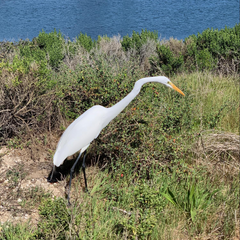We were delighted to hear from Visala Tallavarjula, a sophomore at UC Santa Barbara majoring in Environmental Studies. Visala shares a bit about the choices she's made along her path to climate action and the inspiration she has drawn from guests on our podcast.
- Diana Donlon, Executive Director of Soil Centric

By Visala Tallavarjula
From the moment I set foot on campus, I knew that University of California Santa Barbara (UCSB) was the perfect environment for me. It lured me in with its beautiful beaches and the welcoming community of Isla Vista, but I stayed for the top-notch academics, insightful professors, the plethora of opportunities, and, last but not least, its history as one of the first universities in the world to establish an undergraduate environmental studies program. Established in 1970, the Environmental Studies Program at UCSB was created in response to a terrible oil spill in Santa Barbara. I’ve just finished my first quarter as a Sophomore at UCSB, but the university has already made such an impact on me. When I just began my studies, I was so lucky that I knew, from the beginning, what I wanted to major in. For many people, figuring out one’s major is a lengthy process but I knew from the moment that I chose to go to UCSB that I wanted to major in Environmental Studies.

How could I be so sure about this? I honestly couldn’t. I had to trust my intuition on this one and it’s probably one of the best things I've ever done because I love my major, my professors, my community, and my college. I’ve always been extremely interested in conserving the earth’s natural resources (especially water), reducing CO2 emissions, and protecting our wildlife but until I took English 23 (a.k.a. Climate Crisis 101) my freshman year, I’d never taken a course that gave me information that I could actually apply to my own life and share with my peers. This course, taught by Dr. Kenneth Hiltner, a professor in the English and Environmental Studies Department, gave me tangible and effective ways to help combat the climate crisis.

Would you like to know the # 1 way to actually make a difference in the world as an individual? Eating only what we need to eat, and no more thereby reducing food waste. (It turns out that so much food is currently wasted worldwide that if food waste was a country it would be the third biggest emitter of greenhouse gases). Dr. Hiltner (or Ken, the way he prefers students to address him) details the different ways we can reduce the amount of carbon emissions we each emit on his website. In fact, taking not only this overview course but also a few other courses Ken taught inspired me so much that I realized that I want to do more with my background in Environmental Studies.
I’ve discovered that I want to use my background knowledge of environmental studies as a starting point for something else: Environmental Journalism (combined with Environmental Policy). And it was at this point that I learned about Soil Centric, an organization dedicated to helping people uncover their path to climate action by getting involved with regenerative agriculture and ecosystem restoration. Soil Centric’s interactive Pathfinder Tool is really interesting to me because I’ve been studying ways to reduce fresh-water wastage in agriculture for about five years. The Pathfinder provides a wide array of resources and opportunities focused on building soil health. Healthy soil directly increases the ground's water holding capacity and is a critical component of my interest -- water conservation.
Soil Centric also provides real-life examples of how people have found their way to regeneration. Exploring the site, I saw that other students also want to make a difference in the world by helping our environment and this makes me so excited and hopeful for the future!
For example, “Alex’s Guide” particularly inspired me because I felt that I could really relate to her journey. Alex, a young Canadian woman, and I actually had very similar experiences when it came to inspiring instructors; She also once had an influential Environmental Studies teacher who taught her about how humans have induced climate change. Alex felt that this was a significant moment for her in terms of realizing how much she truly wanted to devote her time and energy towards preventing climate change. Listening to Alex’s story on “Unconventional Paths” Soil Centric’s podcast, I found comfort and solace. Not only is her path similar to my own, but to that of other students that I’ve met throughout my life who are looking for nature-based climate-solutions.

Life is full of ups and downs, twists and turns, but every person can make a difference on this earth. Perhaps we all have a unique path that will eventually take us in the right direction- and this Pathfinder can help us find it faster! Even after my time at UCSB, I will continue to refer to Soil Centric's Pathfinder whenever I seek inspiration from others who, like me, are dedicated to making a world of difference.

Visala Tallavarjula’s passion for water conservation started in high school during which time she was the Council Chair, Youth Commission of the Santa Clara Valley Water District. She was also a finalist for MIT's THINK Scholars for her project, "Smart Scheduling of Irrigation using Weather Sensor Data." Ms. Tallavarjula is currently a sophomore at the University of California, Santa Barbara.
